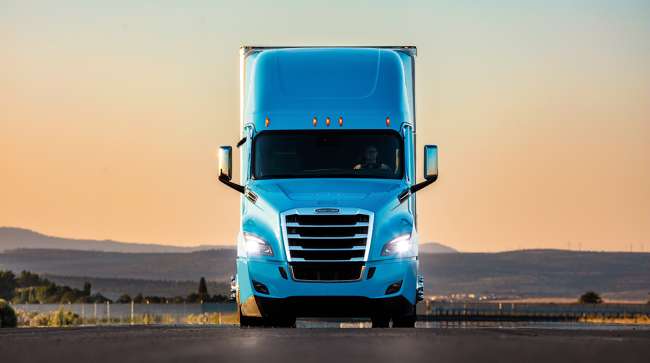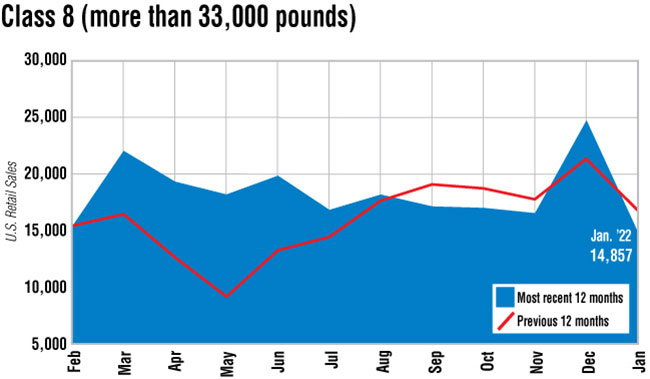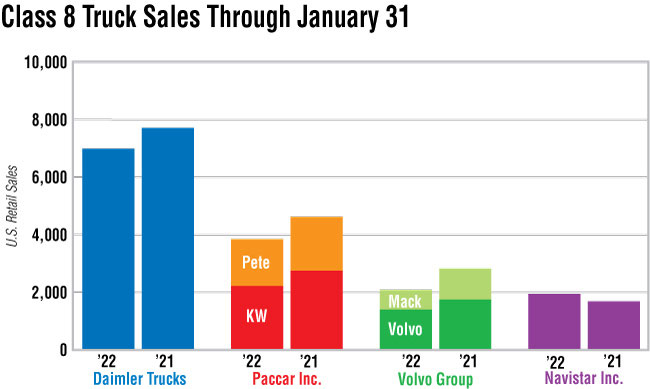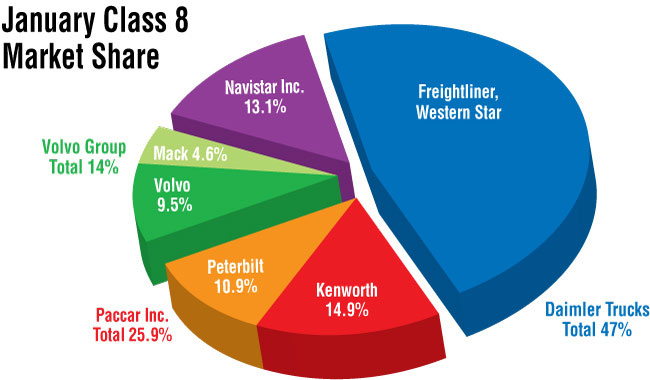Senior Reporter
January Class 8 Sales Drop

[Stay on top of transportation news: Get TTNews in your inbox.]
Class 8 U.S. retail sales in January slipped below 15,000, an 11.8% decline compared with a year earlier, Wards Intelligence reported.
January sales fell to 14,857 compared with 16,844 a year earlier, according to Wards. December’s year-high total was 24,716.
Supply chain issues continue to defy normal operations, and it was a mixed month for the truck makers — three improved sales and four did not, with two of those falling sharply, compared with a year earlier.

“What I know is drivers are very hard to get and trucks are even tougher,” Derek Leathers, chairman and CEO of Werner Enterprises Inc., said in a recent earnings call.
Werner Enterprises ranks No. 17 on the Transport Topics Top 100 list of the largest for-hire carriers in North America.
“Reduced new truck availability is increasing the percentage of our trucks not covered by chassis warranties,” Leathers said, “which is increasing our truck maintenance expenses.”
If January’s volume is simply annualized that would put the year at about 178,000, said Steve Tam, vice president of ACT Research, and if adjusted for seasonal factors, that puts it at 217,000.
“Our forecast for this year for U.S. Class 8 retail sales is 247,500,” he said. “In that regard January’s sales were a bit of a disappointment.”
Peterbilt Motors Co., a unit of Paccar Inc., dropped a leading 41% to 1,623 trucks, and earned a 10.9% market share.
Mack Trucks, a unit of Volvo Group, dropped 36.9% to 683 trucks and earned a 4.6% market share.
Volvo Trucks North America, also a Volvo Group brand, fell 19.6% to 1,404 trucks, good for a 9.5% market share.
“After Volvo Trucks North America experienced a strong fourth quarter in 2021 and specifically, an exceptional December, our deliveries were affected in January of this year due to COVID-19 and continued supply chain disturbances,” said Magnus Koeck, vice president of strategy at Volvo Trucks North America.
“In January, we had a 9.5% market share in the U.S., and in Canada we did well with a 14.8% market share,” he said. “We are now on track for increased deliveries in the upcoming months, but we expect the industry will continue to face labor shortages and supply chain constraints which will continue to impact the retail numbers as the demand continues to outpace supply.”

Market leader Freightliner slipped 10.6% to 6,514 trucks. It notched a 43.8% share. Freightliner is a brand of Daimler Truck North America.
Kenworth Truck Co., also a Paccar brand, improved the most as it climbed 18.7% to 2,218 trucks. It earned a 14.9% share — the second highest.
International, a brand of Traton Group’s Navistar International Corp., rose 15.3% to 1,950 trucks and pulled down a 13.1% share.
In a recent virtual news conference, Navistar CEO Mathias Carlbaum said, “There is still investment and interest in combustion engines. The peak is still ahead of us. There is huge potential improvement on fuel consumption on the current platforms, it is immense.”
DTNA’s Western Star brand rose 11.2% to 465 trucks and a 3.1% share.
Typically there is a 40% drop in sales from December to January, Tam said. “It was 39.9%. The truck makers were very aggressive with production in December. They shipped everything they could possibly ship. They pushed incomplete trucks out there — for instance, no cabinets, no curtain for the sleeper berth, no passenger seat — with the owners’ approval. They got the truck, an invoice and an IOU.”
Don Ake, vice president of commercial vehicles at FTR, called January sales nondescript and said they met expectations.
He said he thought maybe some of the red tag trucks that hadn’t moved in December could have rolled over into January deliveries. But they didn’t.
“It will be interesting to see the January inventory numbers,” Ake said. “You want the market to balance as quickly as possible and that may be the first place you see it.”

On the supply side, the outlook for truckload capacity continues to be constrained, David Yeager, chairman and CEO at Hub Group, said during the company’s latest earnings call.
Yeager cited “a shortage of drivers, backlog of imports, issues with truck production, rising insurance expenses and regulatory changes,” adding the company intends to take delivery of more than 750 tractors.
“The majority of which are replacements for older models that have an attractive ROI with lower maintenance costs and improved fuel efficiency,” he said.
Hub Group ranks No. 13 on the TT Top 100 list of for-hire carriers.
Meanwhile, Leathers doesn’t expect the driver market to change. “I mean, it’s an ongoing demographic uphill challenge that we face over the next several years and by we I mean in the industry.”
Other truck makers did not respond to a request for comments.
Want more news? Listen to today's daily briefing below or go here for more info:



